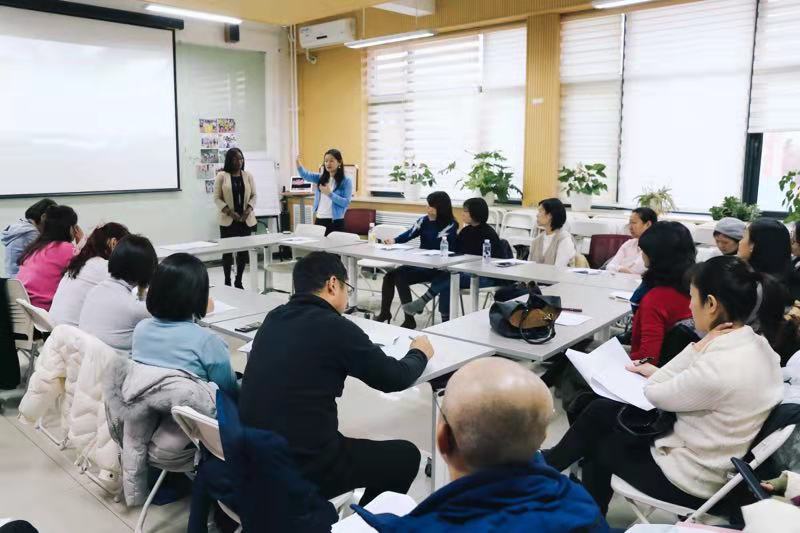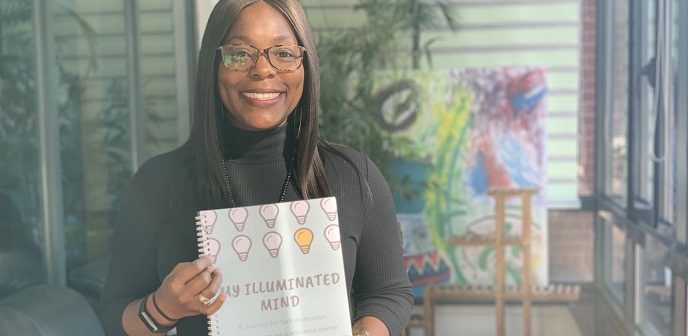‘’This is the east, we don’t do that here.’’ This is just one of the many responses Ms Kindall Tyson has been met with in her pursuit to better her students’ mental health. I sat down with Tyson as she shared her “Coming to Beijing” Story, and how she has managed to effect change, not only in her community back home, but in the greater Beijing community.

Kindall Tyson holding her journal ‘ My Illuminated Mind’
Like most foreigners, she came to Beijing on the wings of change. Looking to transition from a previous job, she worked the network of friends already established and working in Beijing to find the position that she currently holds. After successful interviews, she was on her way to Beijing and has been here for the past two years. Tyson, currently working as a professional school counselor at Tsinghua High School, recounted her ups and downs in the mega-city that is Beijing. “There are people everywhere. It is a city of 22 million people, and coming from Houston, it is a big adjustment,” she lightheartedly commented. Further describing what many foreigners of color feel like while navigating social spaces in Beijing – like a spectacle. From people taking photos of her from the train to staring and leering, there is nothing from the ‘Foreigner in Beijing’ starter pack that she is yet to experience. But she takes all this in her stride, as part of the spirit which keeps this city moving while reminding her to remain grounded in herself.

Tyson with her students
But her journey to be the licensed therapist that she is today, and her passion to help people through their darkest times, was far from a whim. As she put it, in her own life as a black person growing up in America, there were defining racially-driven experiences that were a source of great trauma which she had to work hard on getting through, and she hopes no one else will ever have to undergo the same sorts of traumatic experiences of racism and sustained microaggressions. Her drive to be as dedicated to her students and their welfare is unsurprisingly also inspired by her own upbringing, as her mother was an educator for 32 years.
Tyson’s own experiences in school weren’t particularly rosy. She recounted an incident with a disrespectful teacher who sort to curtail her creativity and ambition. “She said that my writing wasn’t of a high caliber”, Tyson told me, and the teacher continued to discredit Tyson’s thought process. Her response to the situation was to call her mother, who had always encouraged her to know that she had a voice, but also be mindful and respectful, knowing which battles to wage and fight herself, and those to let her parents handle. “But I was lucky because I had the network to help me in such times. My parents were very supportive and I grew up knowing that I had a voice,” Tyson commented on her upbringing.
Sharing her story, Tyson reminded of worrying trends which were a way of life when I was a student and persist to this day. Many of us have had the unfortunate experience of being under the tutelage of unprofessional or uncaring teachers who work to undermine seemingly minuscule efforts which were gargantuan coming from us. And there was no reprieve for many at home either, as most parents of earlier generations did not believe in mental illnesses, or that students could suffer from stress. Asa student, you had only one job – get good grades and proceed to a good University. Anything that would happen in between was nothing but white noise, to be ignored, even clamped down.Those of us who went through such experiences are now parents, dealing with the problems with their children that they did when they were children. And one of two things happen. Parents either become over-protective or adopt an equally blase approach as did their parents before them.

Tyson at a workshop with parents
There is a desire to conform; a desire to please by students. Parents do the very best they can, want the very best for their children, however this does not always manifest itself in the healthiest of ways. According to Tyson, this can interfere with holistic functioning of students, and might follow them well into their adulthood. In a world where students are constantly subjected to ranking, there is a push for perfection, with the unfortunate effect of causing feelings of worthlessness in the event that students don’t top the chart. This form of cognitive dissonance causes an increase in anxiety, tendencies towards self-harm, and suicidal thoughts with plans to follow through among other detrimental effects. This is further compounded by some parents’ refusal to accept the fact that their children might need mental health assistance. It can be quite challenging, notes Tyson, particularly for an outsider to find the perfect balance between respecting cultural boundaries which govern conversations around mental health, and finding a holistic way of providing assistance. To this end, Tyson works alongside parents, organizing parent workshops to highlight the importance of mental health awareness.
This is a massive change from Tyson’s previous position in America, where she worked directly with students who usually had parents who were deceased or incarcerated. In comparison, her students in America had to become independent and self- sufficient at an early age as there usually were no parents to guide them. They also faced other challenges, such as financial and emotional pressures along with the neglect and abandonment suffered when one loses one’s parents. However, this is far from an exclusively American problem. As Tyson notes, while many of her students in China have few financial worries, they still face the same sense of abandonment from exacting parents who are rarely available. One of the reasons why Tyson came to this city could be considered the root of this sense of neglect. “People come here to grow and nurture parts of themselves, especially professionally,” she said. Indeed, this city thrives on a drive for success, unparalleled in the rest of Asia. This in turn means that children are neglected by parents who work long hours, while still pushing their children to succeed in their academic pursuits, which is itself a double-edged sword.

Tyson admits it has been a challenge trying to encourage her students to seek her assistance as and when they feel they need it. She encourages her students to visit her office and just ‘be’. The students express a fear which is more or less entrenched, a fear of losing face, of being discovered. But once they experience the intimacy and privacy of sharing with a professional, they relax and seek much needed help. Things get tricky however, as at times parents have to be involved. Parents who, in some cases, are the reason for their children’s anxieties. Children, she explains, feel the need not to burden their parents with their problems. In the face of adamant refusal from certain parents, she encourages parents to realize that there are many ways in which to potentially approach their children’s problems. In her school, students are in the process of creating a mental health awareness club, to promote awareness and support for students who are in need of it. “Someone has to bear the imputes of making this particular change and I will be your biggest cheerleader”, is the encouragement that Tyson gives her students.
And in this way, “My Illuminated Mind” journals were born. This is a step in the right direction towards a long-term plan to increase awareness of mental health issues for Tyson. As she puts it, the journals were born out of a desire for authenticity. Tyson desired to give people something tangible, in which they can pour themselves into. As a therapist, she highly recommends journals as a way to find catharsis, and as an avid user of journals herself, she attests to their effectiveness as tools to aid in self-actualization. Complete with inspirational quotes and productivity matrices, “The Illuminated Mind” also contains a love letter of sorts, as Tyson shares how the journal came to be. “It is a way to get started, and might provide the impetus to beginning the rest of your life.” The journals are available in Chinese and English, providing much needed inspiration in both languages. The journal is one step in a long journey of continuing to provide mental health support in Tyson’s future. She is currently working on a book which aims to provide some understanding on mental health issues suffered by expatriate communities, and how to combat some of these challenges. But for now, she is more than happy to have her first step effecting change in people’s lives in a meaningful way.
Photos: Courtesy of Kindall Tyson




